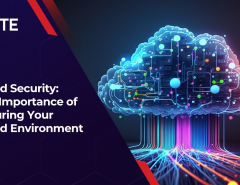The worldwide cloud computing market is expected to grow to $191 billion by 2020. There are numerous advantages of cloud computing driving a move to the cloud; among them lower cost, faster time to market, and increased employee productivity. But what exactly is cloud computing?
What is cloud computing and how it helps?
Cloud computing is a term for the delivery of hosted services over the Internet. It means the practice of using a network of remote servers hosted on the Internet to store, manage, and process data, rather than a local server or a personal computer. It relies on sharing of resources to achieve coherence and economies of scale similar to public utility systems. It is undeniable that cloud computing helps companies to minimize upfront IT infrastructure costs and helps to get their applications running faster and more effectively.
However, it would be foolish to imagine that such a highly advantageous application is totally fool-proof and does not bring with it huge security risks and challenges. Most data analysts and security experts have listed six major threats to cloud computing, though others like The Cloud Security Alliance (CSA) have identified nine such threats.
Read more: Security threats in Cloud Computing
Threats to cloud computing
The two major threats which have been identified are the loss and theft of intellectual property. Companies increasingly store sensitive information in the cloud as it is a much cheaper and effective option. However when a cloud service is breached, cyber criminals can gain access to all this sensitive data. According to the CSA report, “If a multitenant cloud service database is not properly designed, a flaw in one client’s application could allow an attacker access not only to that client’s data, but every other client’s data as well.” While a data breach is the result of deliberate and malicious actions, data loss can occur when the encryption code of the stored data is lost.
While data breach and loss are both serious threats, the measures put in place to mitigate one can actually increase the other. While encryption can protect the data, loss of the encryption key leads to complete loss of the data. On the other hand the cloud routinely makes copies of the data as back up. But the more the number of copies the greater is the exposure to data breaches.
Data privacy
Most companies nowadays operate under some sort of regulatory control of their data, for example the HIPAA for private health information or the FERPA for student records. Often this information is stored in the cloud with very limited access and under strict regulations. If this data privacy is violated, it can have serious consequences. Another important threat to cloud computing is when the company does not have any control over the end use of the user of the data. An employee with access to such information can create havoc by malicious use of the data seriously compromising the reputation and trustworthiness of the company concerned.
Read more: Cybersecurity and Compliance requirements: Part 1
Cloud services can also be used for data exfiltration or extrusion. This is the unauthorized transfer of data from a computer or a storage device like the cloud. Cyber criminals can then encode sensitive data and share them on social media. Similarly contracts among business houses restrict how data is used and who is authorized to access it. If an employee moves any such sensitive information to the cloud without proper authorization, it can mean a serious breach of contract or confidential agreement and can lead to legal complications. In turn this can lead to trust deficit of the company concerned. If a breach of trust is suspected, clients may prefer to take their business elsewhere. In a chain reaction this will mean a huge revenue loss for the concerned company.
The latest threat to cloud computing that has been added in 2018 is Spectre and Meltdown. Recent research has revealed that nearly every computer chip manufactured in the last twenty years contain fundamental security flaws. The specific variations on these flaws are dubbed Spectre and Meltdown. This is a huge risk for cloud service providers as the security flaws in the computers can be easily hacked.
Seqrite Endpoint Security Cloud provides a simple and comprehensive platform to manage the security for multiple endpoints remotely from anywhere. Integrating innovative technologies to provide protection from advanced threats at different levels, Endpoint Security Cloud ensures complete security with easy manageability.
As an IT security partner for your business, Seqrite provides comprehensive security from advanced cyber threats. To know more




